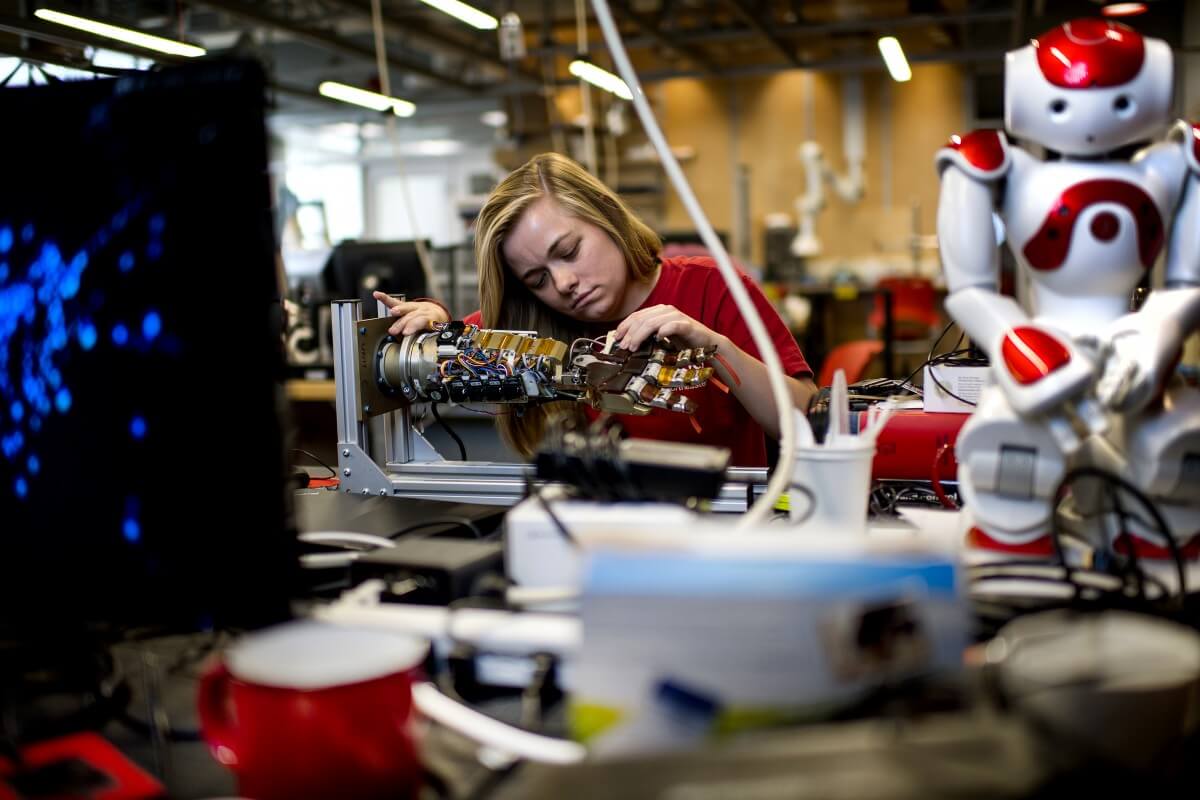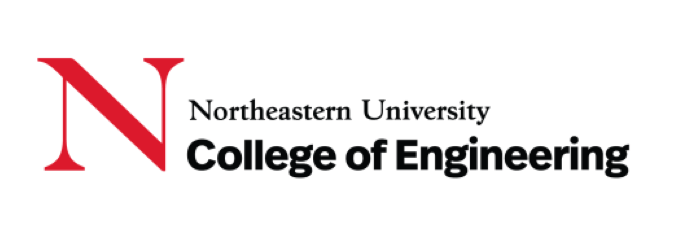“When I came to Northeastern, it was the first place I was treated like a real person, a person with potential.” – Jennifer Morales, PhD ’18 Bioengineering, and vice president of Northeastern’s chapter of Graduate Women in Science and Engineering
Globally-elite and known as a knowledge hub of Boston, Northeastern University’s Graduate School of Engineering designs and delivers 29 Master of Science and PhD degrees. Renowned for pioneering the high-tech, as well as biotech and academia, this institution serves the needs of a complex, ever-changing industry.
Innovation is the beating pulse of all Northeastern programs, with opportunities like project-based learning and industry experience serving as a platform for professional growth. This community is powered by a strong graduate research culture, offering cutting-edge facilities and collaborative endeavours across government, industry and academia itself. In this space, influential and inquisitive minds seek solutions to pressing global issues.
Shared values unite PhD-centred activities at Northeastern Engineering, inspiring influential critical thinkers to tackle society’s most challenging problems.

Source: Northeastern University
All PhD programs blend rigor with social impact, enriching the world through excellence with purpose. Promoting novel content and pathfinding approaches, PhD students here transcend disciplinary and international boundaries, while the integration of scholarship, research training, collaborative fieldwork and career development provides a uniquely experiential education.
Among a vast spectrum of resources open to PhD students, Northeastern’s PhD Network forms a strong community and is a backbone of success. From here, students can access mentoring, networking events and a host of invaluable tools, including information on living in Boston, research, career guidance, and more. There are also many funding opportunities. Students who apply by January 15 as part of the regular application process can be considered for assistantships and prestigious fellowships, while travel funding allows students to present research at venues that provide professional development and visibility to enhance their careers.
Both students and faculty from diverse cultures and backgrounds drive quality, consistently bringing a broad range of perspectives to the school’s distinctive programs.
Engineering PhD Programs:
The Doctor of Philosophy in Bioengineering is designed to take advantage of the school’s considerable strength in multiple areas of traditional and bioengineering.
Here, students collaborate with one of more than 75 members of faculty, working towards a degree that’s tailored to their interests, or otherwise takes advantage of one of eight “strength” tracks.
This is a field that poses exponential benefits to the development of humanity, and this level of innovation is empowered at Northeastern Engineering. Take David Walsh, a PhD candidate who, every two months, supports his 91-year-old grandmother as she receives a drug injection to her eyes for macular degeneration.
To solve this painstaking problem, Walsh is developing a device that monitors the efficacy of treatments for two eye diseases: age-related macular degeneration and diabeticretinopathy. It’s a tool that will improve quality of life not just for his grandmother, but for the world at large.
This PhD is completely research-based, with minimal and flexible course requirements that can be pursued on a full- or part-time basis.
Students enrolled in the PhD in Computer Engineering have the chance to pursue one of the many engineering graduate certificate options in addition to or in combination with this program.
As a field that’s infiltrating every aspect of life at breakneck pace, these advanced research graduates become the engines that drive technological transformation. Doctoral student Murphy Wonsick envisions a world where humans and robots coexist as friends. She spends her days at Northeastern trying to work out how astronauts and robots can work together to complete dangerous tasks in space.
“For a spacewalk, instead of sending two humans into this high-risk situation, why not send a human and a robot?” she says.
“If you think about it, having two very different humans – one short and one tall – figuring out how to perform a task isn’t all that different from what we’re working on here. We have differences among ourselves and we figured it out. If we can do it, we can figure out how to teach robots to do it.”
Wonsick’s project, when perfected and implemented, can save human lives at the same time as helping us unveil the wonders of the universe.
The Graduate School of Engineering offers an Interdisciplinary Doctor of Philosophy degree, encompassing substantial work in two or more academic departments or disciplines. Those interested in this program must submit a detailed proposal of their respective areas of inquiry and research alongside their application for admission.

Kate Duffy. Source: Northeastern University
As part of her Interdisciplinary Civil and Environmental PhD, student Kate Duffy completed a successful internship at NASA’s Ames Research Center.
“This summer at NASA Ames I worked to develop a deep learning approach to atmospheric correction, the process in which top-of-atmosphere satellite images are processed to remove the effects of gases and aerosols in the atmosphere,” says Duffy.
“This work represents a step toward retrieving a higher temporal resolution surface reflectance product than is available from polar satellites, with lessened need for atmospheric data collection and lighter computational demand,” she adds.
“Additionally, I had the opportunity to tour NASA’s Pleiades Supercomputer facility and collaborated on a white paper report exploring cloud computing options in the context of machine learning, comparing them to NASA’s high-performance computing capabilities.”
This experience – and so many more – may not have been open to students like Kate without the help and support of Northeastern.
Other programs in the schools PhD portfolio include: Chemical Engineering, Civil Engineering, Electrical Engineering, Industrial Engineering and Mechanical Engineering.
At Northeastern, every PhD students has the chance to acquire experience beyond traditional dissertation research. This means they leave ready to make a greater impact and enrich their careers, both within and far beyond the realms of academia.
Click here to explore Northeastern’s PhD faculty.
For priority consideration to Northeastern’s PhD programs, apply before January 15th, 2019.
Follow the College of Engineering on Facebook, Twitter, YouTube, Instagram, LinkedIn, and Weibo
Liked this? Then you’ll love…
Engineer a brighter future through research at Northeastern University
Northeastern University engineers your success with multidisciplinary graduate degrees











